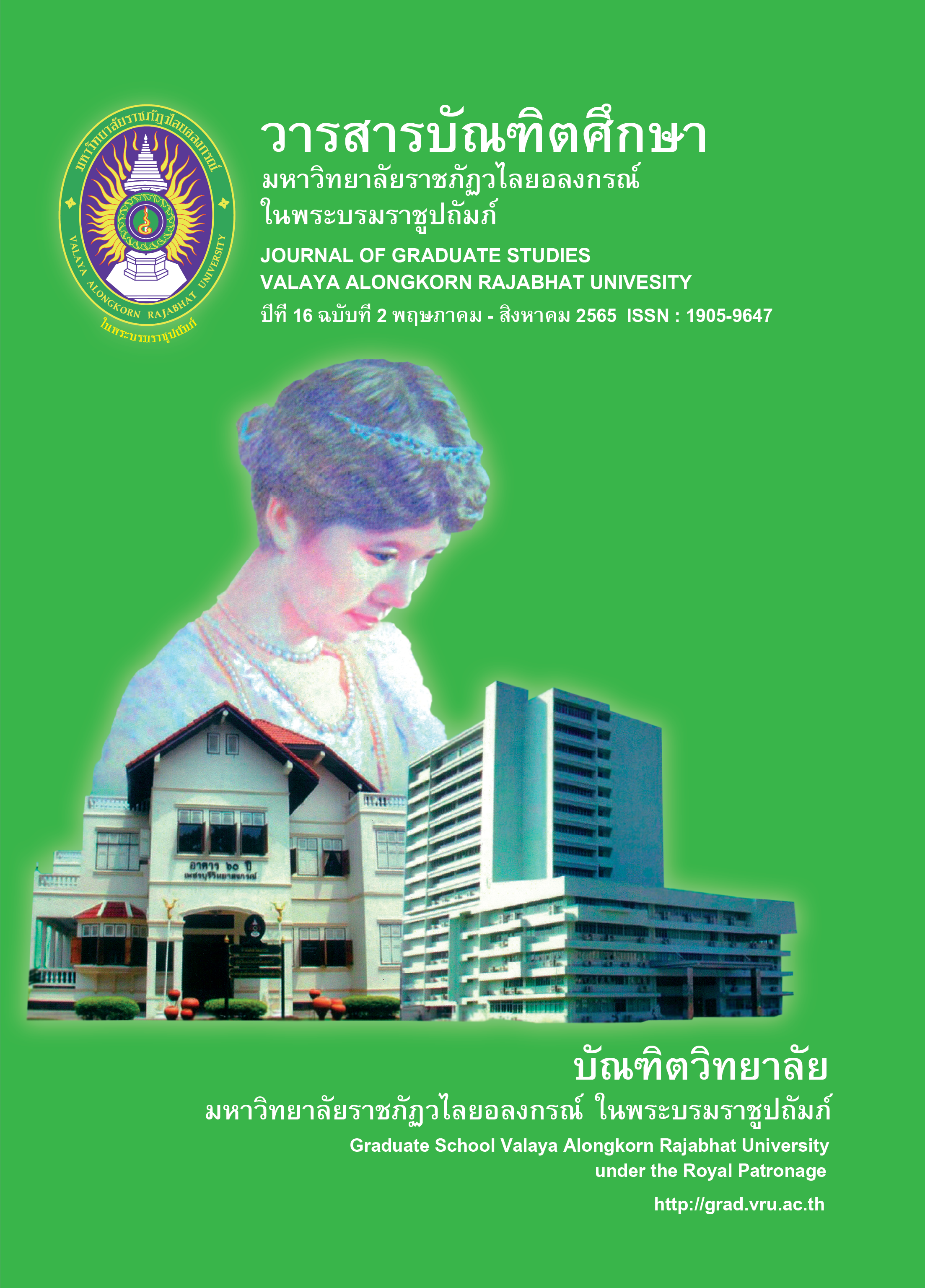A LEARING MAMAGEMENT WITH INTEGRATION OF GROUP LEARNING AND PROBLEM BASED LEARNING TO ENHANCE PROBLEM SOLVING ABILITY AND MATHEMATICS LEARNING ACHIEVEMENT OF UNDERGRADATE STUDENTS
Main Article Content
Abstract
The purposes of this research and development were 1) to develop a learning management with integration of group learning and problem-based learning to enhance problem solving ability and mathematics learning achievement of undergraduate students, and 2) to study the using results of the learning management with integration. The research was conducted in two parts. Phase 1, the development of the learning management. The samples were 376 students and 116 professors selected by stratified random sampling from public universities in region and Bangkok. Phase 2, the study of the results of using the learning management that developed by quasi-experimental research. The sample was King Mongkut's University of Technology Thonburi 1st year students in 2020, students consisted of experimental and control groups with 40 people per group that was selected by cluster sampling from ten groups. The mathematics learning achievement test and problem-solving ability test of pre- and post-learn to solve mathematical problems were the tools used in the research. The research instruments were made to have quality, consistency in the range of 0.8-1 and the confidence of the test were 0.96 and 0.84, respectively. The data was analyzed calculating mean, standard deviation, and Multivariate analysis of variance. The score of mathematics learning achievement and problem-solving ability before learn were the variant covariant of analysis.
The results of this research can be summarized as follows; 1) the developed learning management model was composed of principles, objectives, and instructional process consisted of the following six steps, (1) reviewing previous knowledge, (2) group management, (3) study the problem situation, (4) researching to expand knowledge, (5) reflect the solution, and (6) knowledge and evaluation summary. 2) The results showed that the group using the developed learning management model had higher learning achievement and math problem solving ability than the group using the original learning management model at the statistical significance level of .05.
Article Details

This work is licensed under a Creative Commons Attribution-NonCommercial-NoDerivatives 4.0 International License.
บทความทุกเรื่องได้รับการตรวจความถูกต้องทางวิชาการโดยผู้ทรงคุณวุฒิ ทรรศนะและข้อคิดเห็นในบทความ Journal of Global of Perspectives in Humanities and Social Sciences (J-GPHSS) มิใช่เป็นทรรศนะและความคิดของผู้จัดทำจึงมิใช่ความรับผิดชอบของบัณฑิตวิทยาลัย มหาวิทยาลัยราชภัฏวไลยอลงกรณ์ ในพระบรมราชูปถัมภ์ กองบรรณาธิการไม่สงวนสิทธิ์การคัดลอก แต่ให้อ้างอิงแหล่งที่มา
References
Casner, L. J., Rosenblum, E., & Wright, M. (2009). The ill-prepared U.S. workforce: Exploring the challenges of employer-provided workforce readiness training. Retrieved from http://www.shrm.org/Research/SurveyFinding/Articles/Documents/BED. 09Workforce_RR.pdf.
Dick, W., Carey, L., & Carey, J. O. (2005). The systematic design of instruction. London: Pearson.
Eggen P. & Kauch, D. (2006). Strategies and models for teachers’ content and thinking skills. Boston: Pearson.
Eggen P. & Kauch, D. (2011). Strategies and models for teachers. Teaching content Abd thinking skills. Boston: Pearson Higher Ed.
Elizabeth, M. (2010). Creating a Community of Math Learners: Effective Strategies for Academic Success. Pennsylvania: Penn State University Professional Development School.
Gardner. (2018). Group Learning. Retrieved from http://www.makinglearningvisibleres ources.org/uploads/3/4/1/9/3419723/definition_of_a_learning_group.pdf.
Johnson D. W., & Johnson R. T. (2009). An educational psychology success story: Social Interdependence theory and cooperative learning. Educational Researcher 2009. 38(5), 365-379.
Kasim, N. & Khalid, F. (2016). Choosing the Right Learning Management System (LMS) for the Higer Education Context. A Systematic Review IJET. 11(6), 55-61.
Kathleen, J. K., Mclaughim, T. F. & Vikki, F. (2001). A comparison of cooperative learning and small group individualized instruction for math in self-contained class for elementary students. Education Research Quarterly. 24(3), 41-56.
King, R. (2018). What are the 21st-century skills? Retrieved from https://k12.thoughtfullearning.com/FAQ/what-are-21st-century-skills
Ministry of Education. (2008). Basic Education Core Curriculum 2008. Bangkok: Publishing House. Teachers Council.
Ministry of Education. (2017). Education statistics for the year 2016. Bangkok: Agricultural Cooperatives of Thailand Ltd.
OHEC. (2017). Framework for Higher Education Qualifications, Bangkok: Thailand Office of Higher Education Commission.
ONEC. (2017). National Education Plan 2017-2036: Bangkok, Prikwan Graphic Co., Ltd.
Phanich, V. (2012). Methods for creating learning for students in the 21st century. Bangkok: Sodsri-Sarit Wongkee Foundation.
Piaget, J. (1965). Judgment and reasoning of child. London: Poutledge and Kagen Paul.
Predasawat, W. (2017). Report of mathematical proficiency test of first students enter the bachelor's degree KMUTT. Bangkok: Gifted Education office KMUTT.
Sailor, W., Stowe, M. J., Turnbull, H. R. & Kleinhammer, T. P. (2007). A case for adding a social-behavioral standard to standards-based education with schoolwide positive behavior support. Remedial & Special Education, 28(6). 366-376.
Sharma, M. (2009). How important are soft skills from the recruiter’s perspective? ICFAI Journal of Soft Skills, 3(2). 19-28.
Taylor, A. (2005). What employers look for: The skills debate and the fit with youth perceptions. Journal of Education and Work, 18(2). 201-218.
University Council Association (Thailand). (2018). Survival Way for Thai Higher Education (TAGB Forum 3). Retrieved from https://youtu.be/v1RjlDEVN7Y


